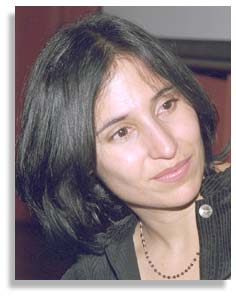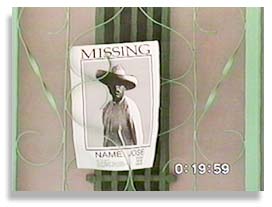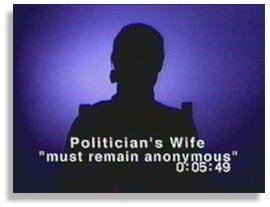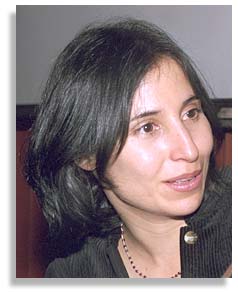|
"Understand that somebody is watching,
somebody is receiving what you are doing" Yareli Arizmendi ... |
|||||||||||||||||||||||||||||||||||||||||||||||||||
Fred Salas: I have a couple of issue oriented questions that I want to talk about. Right now everybody is talking about Latinos coming up through the industry, but to me it really seems like there's Latinos, but not Latinas. It used to be there was a good ol' boys' network, now it's going to be a brown ol' boys' network. Do you feel that because you are a woman you are having a more difficult time? Yareli Arizmendi: Yes. Let us not forget we're multiple personalities in a sense. We are Latino, but we're women. Being women we fall into one kind of discrimination, and being Latino we fall into another. Identity, I think, is multi-faceted. You have to figure out how they are seeing you. Are they seeing you as a woman? When I'm in a general meeting at the Screen Actor's Guild they are probably seeing me as Latina, representative of Latino reality. But if I'm in a Latino situation then they see me as a woman. This happens even in a progressive political movement. The minute you are in an organization all of a sudden you assume the same traditional roles that are expected of you, that you've learned to perform. You have to be careful. I remember fighting in MEChA: "We are going to do a fundraiser for "La Causa" for "La Raza" but do the women have to deal with the food?"' Well women know how to do that really well." "Among many other things?" And of course, they called upon the battle cry of "Tradiciones, for centuries women have been nurturers, they are one with that which nurtures us, feeds us. Don't betray ...." "Oh please, get up and fix your own tacos!" We have to call each other on it, because ultimately it's all about power -- the power to make decisions and make them stick. It is the Latino boys .... Fred Salas: The middle-aged straight Latino boys. Yareli Arizmendi: Got a point there! For example, I remember going on auditions and proudly announcing, "I want to be a dramatic actress. I am Medea." And then I realized, this is the wrong thing to say in Hollywood because, Medea translates into a suffering, distraught woman, crying and embittered because she's been cheated on by a man at the same time that her child has been killed in last night's drive-by shooting. Where's the strength and resolve of this woman called Medea? "Yes, I said, I wanted to be Medea but if you are going to translate it this way, I don't want to." Anglos will translate it that way, Latinos may as well; in this space, they are men. I think it is all about access and power. And women need to also take command. Women need to create their own roles. I was very surprised one time when somebody asked me "Well tell me what role would you like to play?" And I went blank. I know how to complain but I don't know that I know what I would substitute it with. I say let's be one step ahead. Let's know what is it that we want. Let's not just react against what we don't like. That's definitely the way to counter the straight Latino boy thing.
Yareli Arizmendi: I don't want to say that I've found the most incredible man, which I have, but we won't talk about that. Sergio has justice, fairness as his guiding principle. Is it fair to treat somebody like they are less? It's not because I'm a woman or a man, or whatever. He asks that question in every situation. Is it fair to take somebody's pen without asking just because you want to.Well no. I don't think it would be fair for them to get back to their desk and the pen is not there. So why don't you ask? Everything that he does is guided by fairness. In that sense our relationship is a totally fair situation, and it just naturally happened that we allowed each other's strengths. We are a team. We are a team when we work together. We are a team when we love together. He's an incredible painter. So why would I, if I don't do it naturally, fight so hard to learn how to paint? Why double up? We'd rather complement each other. Fred Salas: I have a question from watching the screening tonight at the Cine Club. Do you find yourself subtly moving in a new direction, from being an actress, big time with a great reputation, to being a filmmaker activist. I see people coming towards you for that. You seem to speak from a very even place about it. Yareli Arizmendi: I think that I have always seen myself as a woman of the theater, a woman of film, a woman of the profession that I am in. I never fell for the specializing thing and this drove my professors insane. My BA is in political science and it wasn't because I changed my mind, that I did my MFA in theater. I can't say that it was so planned, but I was in political science not to be a senator but to learn to think about the world that I was living in because I was going to write about it. I participate in creating the world ... my world. I thought, is it better to be doing Shakespeare or learning how to think? It was like "ok, fine, I will go into political science because I find that to be the best way to learn how to go into a situation, assess it, understand it." It was the political thought that attracted me. After that, people were very surprised when I went into theater for my master's. "You changed your mind?" "No -- but if that's the way you want to see it, the only way for you to understand it, be my guest." I always felt that I was born to be an actress in the sense that an actor is called upon to put her feelings at the service of making others understand the situation - think, but more than anything feel situations. It's not about writing a speech; it's about making you, the audience, understand what a certain character in a certain situation is humanly going through. I think that luckily I was given that ability to feel so deeply. I've never questioned the fact. "Should you be an actress or should you be a carpenter - I think you should really be an actress ." I'm not going to sit here and wait till somebody gives me their words that they want said. I want to participate in the creating of the world. In that sense I was very nervous about three years ago when I felt I was not being an activist -- an activist meaning creating, actively creating, the world that we live in.
Fred Salas: Talking about your work, what is some of the favorite work that you have done as an actor? Your favorite roles or performances. Yareli Arizmendi: "Like Water for Chocolate" definitely. I was doing it from an innocent place. No one knew that this film was going to be all over the world and people would love it. It was the first time that I really worked in film. We were committed to the story and telling the story. Just like I am when I come into any theater piece. You don't know what is going to happen with it afterwards. We didn't have words like "distribution", or "picked-up " in our vocabulary! These are words that I know now! I had no idea. The beauty of it is to be part of a work that has made it around the world, that has touched hearts all over the world in places that I have obviously never been to. That is the amazing part of film. Wow! The awareness of "world wide distribution" floored me. Then there are things I have done in Hollywood. For example I did "NYPD Blue". For me it was a very important experience and I thought it was a good role. Anything that gets me to try to understand what is this Hollywood system that we always talk about. Who's in those offices? Who's making decisions? What do they understand when they read what I read? Because we read different, not on the same page. When I read a script and I see one thing, it makes sense, or I hate it, and then all of a sudden I'll hear an executive say "oh that was a great script - we're thinking of developing it." You can't just say "oh you're an idiot." We need to be strategic, so I need to understand what you see. Why you could possibly think that this is good when I'm thinking this is the worst thing I've ever read. I think that it's very important to realize that we don't all see the same thing, and that economic class, racial and cultural realities have a lot to do with it. I'm going to learn your terms because right now you are chief, leader of the game, but I'm going to get very good and might beat you at your game. In the long run, that's how you alter the terms. I love, and this is very Japanese -- Samurai -- The Strategy of War. How do you beat your enemy? You second guess, you pull back, you listen, you wait, you lunge? Remember there's human beings behind the decisions.
The bottom line is we have to find ways of deciding what it is that we want and then just get out there and do it. I'll tell you what I think is going to help us a lot - digital technology. It makes things so accessible that we can go out and make good product. We must "say no" to the cheesiness and the "rasquache" thing You've got to be able to hear the words, and you've got to be able to see the image, There's a thing called editing and rhythm, and we can't be here for four hours - ok? Fred Salas: One piece of advice? Words of caution? Yareli Arizmendi: Know your audience. I think that's one very valuable lesson that I learned from theater - know your audience. Feel it out when you are on-stage. Are they falling asleep because if they are - pick it up and be gone and get out of there. That's what I would say for any filmmaker or TVmaker, any maker. Understand that somebody is watching, somebody is receiving what you are doing. And if not, stay in your living room. That's my humble opinion. Fred Salas: One last question. Class in film, and within races talking about class. Within the Latino culture there's different classes, how are we treating each other. Yareli Arizmendi: Absolutely. Latin America is a culture that is based on class - and it makes no bones about it. When I came to the United States it was the first time of "all men are created equal" - I don't know if the women were - "all men are created equal and we are all the same, and maybe we have a little bit of a problem with race , but we are all the same class." That was very strange to me because I came to that reality at an age when I was a thinking person. I thought to myself, "Don't you see the differences." "Oh no but anyone can do anything that they want and move up." It took me a while to try to understand what was this fantasy that they had going. And again look at the fantasy land of Latin America, especially Mexico. We're all Mexicans - but some Mexicans are more Mexican than others" and there's Mexicans that don't want to be called Mexicans. There's a whole thing with race, ethnicity, that doesn't get explored. In Mexico the class thing is very accepted but "we're not racist". By contrast the United States is saying "there are no classes, but yes we are racists." It's definitely something important that should be talked about. One of my things with Chicano film has been, in particular, this whole idea that if you get out of the barrio you have sold out. That is the bottom line that you see time and time again in Chicano films. I feel that is a very unfair way to treat the person that manages to go to school, go to college becomes a lawyer. "Ah, he's a sellout. He didn't stay in the barrio and become a drug addict." That sounds very romantic, that you went to rehab and you came out and now you are a carpenter. That's a more dramatic story than seeing a guy be successful in Century City as a lawyer. I can tell you, obviously I'm from upper middle class professional parents from Mexico. I can't say that I was oppressed and I was with the indigenous groups of my country and oppressed by the PRI. I don't think that it would be fair if you expect me to be that way. Is that the only way you are going to talk to me if I am that? We need to just be honest, break the opinions wide open. Published in In Motion Magazine December 11, 1999. |
|||||||||||||||||||||||||||||||||||||||||||||||||||
If you have any thoughts on this or would like to contribute to an ongoing discussion in the  What is New? || Affirmative Action || Art Changes || Autonomy: Chiapas - California || Community Images || Education Rights || E-mail, Opinions and Discussion || En español || Essays from Ireland || Global Eyes || Healthcare || Human Rights/Civil Rights || Piri Thomas || Photo of the Week || QA: Interviews || Region || Rural America || Search || Donate || To be notified of new articles || Survey || In Motion Magazine's Store || In Motion Magazine Staff || In Unity Book of Photos || Links Around The World NPC Productions Copyright © 1995-2020 NPC Productions as a compilation. All Rights Reserved. |
|||||||||||||||||||||||||||||||||||||||||||||||||||





